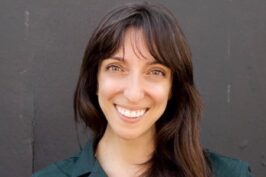Written by one of Canada’s most prolific and popular playwrights, Secret Life of a Mother, developed in Residency at The Theatre Centre, is an exposé of modern motherhood and Hannah Moscovitch’s most personal writing to date. One of her oldest friends, the multiple Dora Award-winning actor Maev Beaty, tells this story, and through it her own motherhood secrets start to surface.
Secret Life of a Mother reveals what two women are actually experiencing: the raw and transcendent and untold secrets of pregnancy, miscarriage, childbirth, and mothering. This is motherhood for the 21st century: hallucinatory, gothic, and empowered. Ms. Moscovitch took time from her busy schedule to answer my 5 Questions… about this very personal project.
HyeM: I think it best to start from the beginning. Can you share how the seed was planted so to speak for Secret Life of a Mother?
Hannah Moscovitch (HM): Well Maev and I were both having families and there wasn’t a lot out there about motherhood that felt like it was for us. There are a lot of taboos around motherhood — which means there are very few authentic portrayals, a lot of it is candy coated and fake. There are also a lot of depictions of mothers as the butts of jokes, unsexy and covered in barf, and there are mothers as seen through the eyes of sons and daughters (usually they’re villains or pests), but not many in their own right. So we wanted to help fix that.
HyeM: Given your previous works are “research heavy projects” and Secret Life of a Mother is more autobiographical, what was your process in writing this piece?
HM: It’s a wholly different processes, yep! One with different advantages and blindspots. There’s less research (although we did interview 70 mothers and fathers about their experience of parenting). But there’s much more self-exposure and therefore less clinical distance, so I relied more heavily on collaborators to figure out how the text was communicating. Also, when you’re writing confessional work, you’re bound by what’s true, you can’t fictionalize, so you have to find a dramatic narrative within your own experiences rather than invent one, so that’s a big limitation you’re working with.

HyeM: I am aware you worked closely with Maev Beaty and Ann-Marie Kerr on this piece. I’m curious about the discussions the three of you had in terms of the themes developing in this piece. What can you share about the discussions among the three of you?
HM: With a piece like this, when you start with a desire to be subversive, to expose a truth, then a lot of the development lies in how to optimally design and execute that exposure. We went through various forms (and by various I mean so fucking many!) before we landed on this one. And discussions between the three of us were all around if this piece of writing or stage work was effective: was it communicating the way we wanted it to? We kept asking “what does this mean” and “what are we saying” until we started laughing when anyone said those words. It was the most collaborative and blended process I’ve been in.
HyeM: Seeing this piece come to life on-stage and sharing a part of yourselves is very personal – it also makes you vulnerable. Is this perhaps part of the reason for writing this piece – so that many of us can understand the many layers of motherhood?
HM: It’s vulnerable. And that’s not my jam normally. I’m a reserved person, so it hasn’t been all that easy to expose myself. But because we were hell-bent on an authentic portrayal of motherhood, the truth – the unfiltered truth – of what I experienced and what Maev experienced felt like the right thing.

Photo c/o The Theatre Centre
HyeM: Motherhood is in a way, such a ‘big’ topic. It has been romanticised, stereotyped, and built up to define many women. In Secret Life of a Mother, you are “offering [a] taboo counter narrative” of motherhood and all it encompasses. What can audiences expect from the experience?
HM: A lot is going to depend on what they come in with, as people. Some will be shocked, because we talk about taboo things. Some will feel represented, possibly for the first time. And we’re looking to make our audiences feel empowered, and to speak back to a culture that’s misrepresenting miscarriage, labour, birth, and, above all, motherhood.






